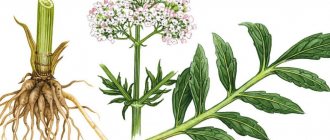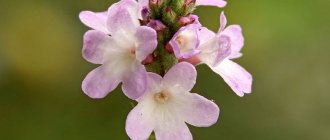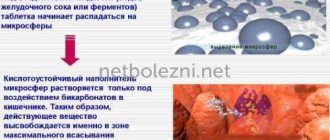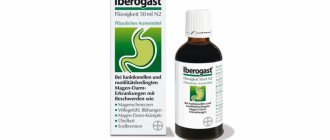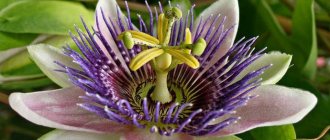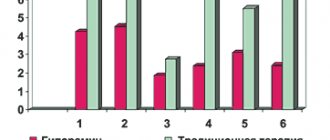Manufacturer: Evalar
Active ingredients
- Not indicated. See instructions
Pharmacological action
- Not indicated. See instructions
- Composition Melissa
- Indications for use of the drug Melissa
- Release form of the drug Melissa
- Use of the drug Melissa during pregnancy
- Contraindications to the use of the drug Melissa
- Method of administration and dosage of the drug Melissa
- Overdose of Melissa
- Precautions when taking Melissa
- Storage conditions for the drug Melissa
- Shelf life of the drug Melissa
Best before date
24 months
Vitamins with similar effects
- Coffeeberry (Capsule)
- Pancreavit (Capsule)
- Golden mustache. V. Ogarkov's drops No. 5 (Drops for oral administration)
- Yinqiao "Silver Feather" (Oral Tablets)
- Yoshi Vitamin Jelly Drink (vitamin complex) (Liquid for oral administration)
- Melissa Premium Fitera (Herbal tea)
- Melissa officinalis (Granules for oral solution)
- Marine calcium for children with vitamins (Oral tablets)
- Marine calcium for children with iodine (Oral tablets)
The description of vitamin Melissa is intended for informational purposes only. Before starting to use any drug, it is recommended to consult a doctor and read the instructions for use. For more complete information, please refer to the manufacturer's instructions. Do not self-medicate; EUROLAB is not responsible for the consequences caused by the use of information posted on the portal. Any information on the project does not replace consultation with a specialist and cannot be a guarantee of the positive effect of the drug you use. The opinions of EUROLAB portal users may not coincide with the opinions of the site Administration.
Are you interested in Vitamin Melissa? Do you want to know more detailed information or do you need a doctor's examination? Or do you need an inspection? You can make an appointment with a doctor - the Euro lab is always at your service! The best doctors will examine you, advise you, provide the necessary assistance and make a diagnosis. You can also call a doctor at home . Euro lab clinic is open for you around the clock.
Attention! The information presented in the vitamins and dietary supplements section is intended for informational purposes and should not be a basis for self-medication. Some of the drugs have a number of contraindications. Patients need to consult a specialist!
If you are interested in any other vitamins, vitamin-mineral complexes or dietary supplements, their descriptions and instructions for use, their analogues, information about the composition and form of release, indications for use and side effects, methods of use, dosages and contraindications, notes about the prescription of the drug for children, newborns and pregnant women, price and consumer reviews, or you have any other questions and suggestions - write to us, we will definitely try to help you.
Melissa officinalis L.
The pharmacological activity of the drug is determined mainly by the components of the essential oil. The compounds in lemon balm essential oil affect the brain, namely the limbic system, which controls autonomic functions and also protects the cerebral hemispheres from strong irritants coming from the periphery. This made it possible to classify lemon balm as a mild phytotranquilizer (RF Weiss, 1985). Melissa increases appetite, stimulates the secretion of gastric juice, eliminates fermentation abnormalities, enhances gastric motility, and has a choleretic and carminative effect.
H. Leclerc (1976) discovered the antiarrhythmic effect of lemon balm. It slows down breathing, reduces heart rate, and lowers blood pressure. Melissa herb has hypoglycemic, astringent properties and stimulates menstruation. An infusion of lemon balm leaves, collected before flowering, is used as a diuretic.
Anti-inflammatory, bacteriostatic and antiviral properties of lemon balm have been revealed. Asthenia aldehydes (citral, citronelal) have antimicrobial activity against a number of pathogenic fungi and mycobacterium tuberculosis (K. Okazaki and S. Oshima, 1953).
Rosmarinic acid provides antiviral activity against herpes viruses, influenza, Semilki forest disease, measles and Nyocastle disease (EC Herrmann and LS Kucera, 1968), influenza A and B viruses. The detrimental effect of lemon balm extract on the herpes simplex virus (Z) has been proven Dimitrova et al., 1993). Rosmarinic acid blocks the binding of human immunodeficiency virus (HIV-1) integrase to provirus DNA and, apparently, thus inhibits its incorporation into the cell chromosome (A. Mazumder et al., 1997).
The anti-inflammatory, anti-allergic and antioxidant effects, anti-complementary and anti-radical properties of lemon balm also depend on rosmarinic acid, which is manifested in the ability to inhibit the activity of lysosomal proteases (elastase, serine proteases).
Melissa extract blocks binding to Graves' immunoglobulin (IgG) hormone receptors, which activate the intrasecretory function of the thyroid gland, while the biological activity of Graves' immunoglobulins is blocked and iodine-containing thyroid hormones are released (M.Aufmkolk et al.).
The cytostatic effect of aqueous extracts of lemon balm has been experimentally confirmed. Caffeic acid and an unidentified tannin-free glycoside from lemon balm leaf extract inhibit protein synthesis in the cell-free system.
Melissa preparations are considered promising for the treatment of endotoxic shock and other immunopathological conditions (H. Bult et al. (1985) and PW Peake et al., 1991), and the use of lemon balm in the cold season increases and mobilizes the body's defenses.
MELISSA OFFICINAL (lemon balm, mother liquor,honey grass, bee grass) - MELISSA OFFICINALIS L.
Sem. Lamiaceae - Laminaceae (labiatae)
DESCRIPTION. Perennial herbaceous softly pubescent plant 50-120 cm high, with a pleasant lemon scent. The rhizome is highly branched and has underground shoots. The stem is straight, tetrahedral, branched. Leaves are opposite, petiolate, ovate, crenate-serrate, pubescent. The flowers are irregular, white, two-lipped, collected 2-10 in false whorls in the axils of the upper leaves. The fruit consists of four small ovoid nuts enclosed in a calyx. Blooms in June-September.
DISTRIBUTION AND PROCESSING. Grows along forest edges and bushes, in weedy places.
For treatment, leaves and tops of stems with lemon balm flowers are used. The grass is harvested during flowering, cutting off the flowering tops with knives or sickles, and dried under canopies, in rooms with good ventilation, in attics under an iron roof, spread out in a thin layer (3-5 cm). On paper or cloth, stirring occasionally, or dryers at a temperature of 25-30ºС. The dried grass is threshed and the coarse stems are separated from its composition on sieves. Finished raw materials are packaged and stored in dry, well-ventilated areas on racks. Shelf life - 2 years.
The leaves are collected as they grow 3-4 times per season, manually tearing off the blades with petioles, and dried under canopies, in rooms with good ventilation, spread in a thin layer on a tarpaulin or fabric, stirring occasionally. The end of drying is determined by the fragility of the leaf petioles. Dried leaves are separated from coarse parts on sieves or shakers, packed in bags and stored in dry, well-ventilated areas. Shelf life - 2 years.
CHEMICAL COMPOSITION. Lemon balm leaves and herbs contain essential oil (up to 0.33%) with a strong lemon odor (it contains citral, citronellal, myrcene, geraniol), as well as tannins, carotene, mucus, resin, ascorbic, caffeine, oleanolic, ursolic acids, mineral salts, sugars. The seeds contain fatty oil (up to 20%).
APPLICATION. Melissa stimulates appetite, enhances the activity of the gastrointestinal tract, has mild anti-inflammatory, antispasmodic, laxative and diaphoretic properties, relieves the stomach and intestines of gases, stops cramps and pain, nausea and vomiting, has a beneficial effect on the activity of the heart, and has a calming effect on the nervous system .
In folk medicine, lemon balm has a long history and is widely used in the treatment of many diseases. An infusion of leaves and tops of stems with flowers is taken for heart diseases, after which pain in the heart area, shortness of breath disappear, attacks of tachycardia stop, blood pressure decreases, and the heart rate becomes less frequent. The infusion is also used for asthma, shortness of breath, various neuralgia, migraines, insomnia, toothache, anemia, and dysfunction of the genital organs and gastrointestinal tract. Externally, the infusion is used for rinsing for gum diseases, toothache and in the form of herbal compresses for ulcers, bruises, rheumatism, gout. A decoction of lemon balm herb is used internally and externally for dizziness, fainting, hysterical fits, and severe pain in the gastrointestinal tract, as a sedative. Melissa oil is used for pain in the heart, palpitations, rheumatic pain, as well as to regulate menstruation and improve metabolism in the body.
Herbal preparations are prepared from lemon balm in the form of medicinal teas, aromatic waters, decoctions, and essential oil is obtained, which is highly valued in the chemical-pharmaceutical and food industries. Essential oil from the leaves is part of the Sanitas balm and liniment, which have a calming effect. RECIPES
Infusion:
2 tbsp. Infuse tablespoons of crushed leaves or tops of shoots with flowers for 4 hours in a sealed container in 2 cups of hot boiled water, strain. Take half a glass 4 times a day before meals for heart disease (tachycardia, heart pain).
Decoction:
Pour 10-15 g of crushed leaves or shoots with lemon balm flowers into 1 cup of boiling water, cook for 5-10 minutes, strain. Take 1 tbsp. spoon 3 times a day before meals for pain in the stomach, intestines and as a sedative.
Poultices:
3-4 tbsp. Scald spoons of leaves or tops of shoots with flowers with boiling water, wrap in gauze. Apply to inflamed and painful areas.
History and myths
The origin of the name of the plant has three versions. According to the first, it comes from the Greek words “meli” - honey and “phyllon” - leaves, and is given to the plant for its honey smell. The second version has mythological origins. Melissa, according to Greek mythology, was a nymph, the daughter of King Melisseus, who fed Zeus with milk and honey, and was supposed to teach people how to get honey. According to the third version, Melissa was a very beautiful woman and claimed to be the first mistress of the gods. However, the goddesses did not like this, and they turned Melissa into an ordinary bee. Melissa officinalis began to be used in medicine more than 2000 years ago. It was cultivated in Ancient Greece and Rome. Melissa was also widely used as a valuable honey plant, as evidenced by the treatises of Theophrastus (227–287 BC). One of the heroes of Theocritus' myth, Laocoon, ate lemon balm. Virgil Maro (70–19 BC), Pliny the Elder and the Greek physician Dioscorides (1st century BC) indicated that beekeepers rubbed fresh lemon balm leaves on their bodies to catch a swarm of bees. The ancient Greeks called lemon balm "kalaminta" or "melissophyllon". In Rome it was known as "apiastrum". Ancient medicine attributed to lemon balm antimicrobial, antiseptic, antidysenteric, sedative effects; the plant helped improve vision and regulate menstrual cycles. The Arab physician Avicenna (979–1037) believed that lemon balm refreshes and strengthens the heart, promotes digestion and helps with hiccups. He recommended lemon balm as a tonic and for the treatment of melancholy. The Arabs began growing lemon balm in Europe at the beginning of the 16th century. in Spain. In medieval Europe, lemon balm was one of the most popular plants. The capitularies of Charlemagne indicated that it should be grown in every garden. The medieval German healer Benedictine abbess Saint Hildegard of Bingen (1098–1179) recommended using lemon balm as an analgesic and sedative for headaches, in particular migraines. Seraphitus the Younger (second half of the 12th century) argued that lemon balm leaves can cheer up and ward off boredom, fear and sadness. Paracelsus (1493–1541) highly valued lemon balm. He equated the properties of lemon balm in terms of potency to gold. The Polish medieval physician Sireniusz (1541–1611) recommended using lemon balm for headaches, as well as pain in the heart and gastrointestinal tract. Particularly popular in the Middle Ages was “Carmelite lemon balm water,” which was made by French Carmelite monks from lemon balm leaves with the addition of mint leaves, lemon peel, coriander seeds, nutmeg and cinnamon. Diseases of the nervous system were treated with this water. Medieval magicians and sorcerers attached magical meaning to lemon balm. The priests of ancient temples prepared a dynamizing drink from lemon balm. Together with wormwood (Artemisia abrotanum L.) and emerald, lemon balm was part of a remedy used to reduce pain during childbirth. As Albert the Great pointed out, whoever carries lemon balm on himself will be loved by everyone, and if he hangs it on the neck of a bull, he will be obedient. In 1522, lemon balm herb was included in the German Brunswick Register of Medicines, and the essential oil was included in the Frankfurt Catalogus, published in 1582. Hieronymus Bock in 1539 produced a wine-melissa distillate called Cardiac, which was used as a cardiac and gastric remedy. In Rus', folk medicine used lemon balm decoctions for stomach cramps, cholecystitis, cholelithiasis, “nervous fevers,” migraines, insomnia, melancholy, hysteria, bad breath and toothache, colds, bronchial asthma, algomenorrhea and painful menstruation, as an anticonvulsant, expectorant and diuretic, to enhance lactation. The plant is recommended as an antiemetic for pregnant women. In addition, sometimes they used lemon balm oil, 3-6 drops per sugar. In Lithuanian folk medicine, an infusion of lemon balm and marjoram was used to improve memory. Melissa is recommended in the form of aromatic baths for skin diseases. Compresses from the leaves and tips of lemon balm shoots are used for rheumatic pain in joints and muscles, bruises, and ulcers.
